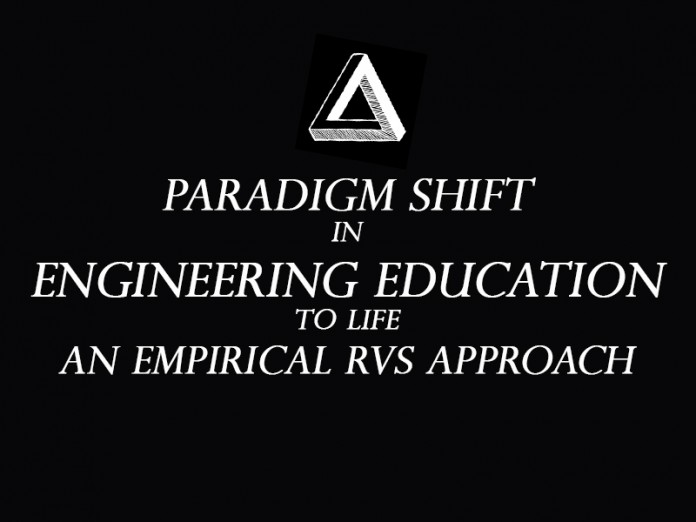Abstract
This paper focuses upon the argument that the role played by the Engineering Profession within today’s society has changed markedly over the past 10 years. From the Industrial Revolution until recently, Engineering played a significant part in society, providing scientific and technological linkages between industry and day-to-day life. Yet at a time when society’s demands on Engineering are increasing, it appears that Engineering Education is at something of a crossroads, seemingly struggling to keep up with the rapidly changing nature of the Profession. Thus it is clear that if, as a Profession, Engineering is going to meet the expectations society is now placing on it, Engineering Education also needs to change.

Important Announcement – EasyShiksha has now started Online Internship Program “Ab India Sikhega Ghar Se”

Keywords: Engineering Education, Empirical Approach
Preamble: Engineering & Society
Over the past three or so decades, the role played by Engineering in promoting societal cohesion and change has shifted from Engineering being viewed as ‘the backbone’ of British Industry in the 1950’s and 60’s to it becoming a substantive and integral driving force that links society and science in an innovative and forward-thinking manner. Indeed, it may be argued that Engineering advances over the past 10 years or so, have provided the impetus for much societal change. This is particularly the case when considering the area of digital Engineering and communication, but is also relevant when taking into account the wide range of other Engineering fields including power, medical, environmental and materials Engineering – all of which have seen innovative advances that have changed the way we live our lives. Yet despite such progress, in many respects Engineering remains a ‘hidden’ Profession and un updated syllabus run year after year.
By bringing Engineering and Society together it may be argued that in many respects, the Engineering Profession acts as Society’s glue innovatively benefitting humanity whilst linking science and society. In the Developed World access to the Public Infrastructure is taken for granted by an increasingly ‘media savvy’ population. Yet within this setting, very little thought is given to the Engineering innovation, and indeed the engineers behind what, in the UK and elsewhere, has become the ‘expected’ standard of life. Whilst science is generally given a ‘high profile, Engineering is generally not on the public radar. Although as a discipline Engineering tends to view itself as distinctive from science, in many respects in the UK in particular, it has been subsumed into science and is viewed by many (non-engineers) as being a part of science.
The need
The key question which therefore needs addressing by Engineering Educators and the Profession as a whole is how to countermand this trend and promote
-
Engineering as a viable, exciting and valid Profession – one that can provide young people with an intellectually stimulating and socially worthwhile career.
-
It is this question that is at the crux of much Engineering Education research – much of which argues that Engineering Education needs to change if it is to successfully capture advances in Engineering.
Engineering Education Research: Time for transform!
The valuable role played by Engineering Education research in guiding and informing Engineering Education, both in the USA and also internationally is reflected in the literature which, amongst other issues, discusses the role that Engineering Education research can play in increasing student numbers and the importance of applying research findings to practice. Other previous work has discussed the difficulties encountered by engineering educators in undertaking pedagogic research. Other aspects of pedagogic methodologies are also given attention in the Engineering Education research literature, with particular attention paid to problems experienced by engineers in identifying suitable approaches and tools with which to investigate learning and teaching approaches. Whilst questions relating to quality and rigour in Engineering Education research continue to drive attempts to improve quality in Engineering Education ultimately enhancing students educational experiences.
The literature has identified the value of collaboration across the disciplines being integral to improving the quality of global Engineering Education research. Whilst the empirical and pedagogic value of collaboration cannot be disputed,
-
Pedagogically it is important that engineers remain the driving force behind Engineering Education research.
-
Yet, whilst it is crucial that engineers take the lead in Engineering Education research, in order that the discipline is able to deal with the issues faced by contemporary society, it is also important that in doing so Engineering Education research practice is expanded to include a wide range of methodological concept and approaches.
In many respects it would seem that Engineering Education and Engineering Education research is at a turning point. It is the right time for Engineering Education to be recognized and lauded internationally, not only for the quality of research being undertaken within the field of Engineering Education research, but also for the contribution being made to the wider pedagogic field in terms of both theory and practice. Yet, whilst there is much excellent work being conducted within the Engineering Education research community – Engineering Education research has not yet developed its own paradigm. It is this gap that the ‘Engineering-Sociology’ paradigm has been developed to fill.
Top Courses in Software Engineering
Problems and Perspectives: The reasons for wastage
Some of the problems identified are
-
Lack of necessary aptitude for the course among the concerned students:
-
Inadequacy of instructional facilities; (iii) Ineffective teaching, possibly because of the teachers not being trained; and a heavy curriculum. Valid as these reasons are even today, there may be many other contributory factors also such as:
a. Non-selective admission of students to the institutions;
b. Changing mix of urban and non-urban background of students without corresponding modifications/orientation of educational methods contributing to the detriment of the nonurban element;
c. Inadequate utilization of even the existing instruction facilities;
d. In spite of adequate capital investment and hardware provided in the institutions quite often, the lack of appropriate matching provision for adequate departmental operating and training costs;
e. Insufficient development of the correct attitudes to the professional education by both the teachers and the students; and
f. External factors, such as lack of motivation because of inadequate or assured employment opportunities at the end of the course.
Scholarship in Engineering Education
Previous work by one of the paper author’s proposed learning and teaching proposition developed to promote and enhance the student experience within Engineering Education. Developed to address the overall pedagogical aim of student success, the above proposition recognizes that one of the main challenges faced by Engineering educators today is how to create a learning environment in which such success can be nurtured and achieved. From this perspective there are three key components necessary to engender such an environment. Crucial to the learning environment, Relationships are key to successful learning – as such they need to be valued and nurtured. Relationships in the learning environment reflect the complexities of the social networks encapsulated within and across educational settings. As such, different types of relationship exist between students and their peers, students and teachers, amongst colleagues and between those in education and other stakeholders including families, employers and other stakeholders such as policy makers. Previous studies have suggested that relationships play a vital part in addressing issues of retention by promoting a ‘sense of belonging’.
This proposition is:
The Variety in learning and teaching reflects the need for engineering educators to adopt an innovative approach. Whilst current trends tend to associate innovation with technology – it is evident that as a concept, Variety can incorporate so much more. Indeed, variety within the learning environment can include a range of different learning and teaching approaches including active learning, work-based learning, project and problem-based learning, to name but a few, whilst it is imperative that all learning and teaching should be contextualized within a discipline-specific setting. Engineering is in a fortunate position in that it can provide numerous opportunities for engineering educators to introduce variety into the curriculum.
The third component, Synergy, captures the concept of constructive alignment, but further develops this approach so as to encapsulate the requirements and expectations of a wider group of stakeholders including Professional bodies, industry and wider society. A synergenic approach to teaching involves deliberately designing the curriculum in such a way so as to engage students by providing realistic, relevant and interesting learning approaches that capture their imaginations whilst meeting university demands in terms of quality and content.
The future of Engineering-Sociology
In response to the challenges of globalization and local development, educational reforms are inevitably becoming one of the major trends in the Asia-Pacific Region or other parts of the world. Based on the most recent research and international observations, this book aims to present a new paradigm including various new concepts, frameworks and theories for reengineering education. It can provide educators, school leaders and practitioners, educational officials, change agents, researchers, and policy-makers with a comprehensive new perspective to implement educational reforms, enhance leadership, and change school management in a context of globalization, localization and individualization.
In the process of critically evaluating the pedagogic value of the RVS approach, it became apparent that there was a real need for a paradigm shift in Engineering Education and Engineering Education research. One of the most important considerations in n developing was the need to take account of a priori knowledge, practice and understanding in Engineering Education and Engineering Education research. The SVR approach contextualises Engineering within its wider social setting; in doing so it brings together two seemingly diametrically opposed academic paradigms, Engineering and Sociology, into a single approach. Coining the term ‘Engineering-Sociology’ this paradigm firmly embeds Engineering Education and Engineering Education research into the wider social context. It reaffirms the role of Engineering as being a key driver of societal change and innovation, whilst providing the means by which Engineering educators can frame empirical research into Engineering learning and teaching practice and policy.
For the purposes of developing the Engineering-Sociology paradigm the American Sociology Association definition of sociology was used: Sociology is the “study of society: a social science involving the study of the social lives of people, groups, and societies: the study of our behavior as social beings, covering everything from the analysis of short contacts between anonymous individuals on the street to the study of global social processes: the scientific study of social aggregations, the entities through which humans move throughout their lives’: an overarching unification of all studies of humankind, including history, psychology, and economics’’ (www.asenet.org).
In developing the Engineering-Sociology paradigm, Engineering has deliberately been prioritised in front of Sociology. In doing so the paper authors acknowledge the fact that Engineering Education and Engineering Education research is essential about Engineering and as such must be led by those best placed to inform and shape the field. Technical Education plays a vital role in human resource development of the country by creating skilled manpower, enhancing industrial productivity and improving the quality of life.
The Technical Education refers to post secondary courses of study and practical training after 10th in Polytechnics and after 12th in engineering colleges/NITs/IITs etc which are aimed at preparation of technicians to work as supervisory staff. The term Vocational Training refers to lower level education and training for the population of skilled or semi-skilled workers in various trades after 8th or 10th in ITIs. During the last decade, India has seen a tremendous increase in the number of Engineering Colleges at Degree level and Polytechnics Colleges at Diploma level throughout the country. Another shortcoming in the area of technical and vocational education is that till now, the number of engineers graduating is more than the diploma holders. This is creating an imbalance, as more workforces are required at the lower level. Hence more polytechnics and Institute for Industrial Training (ITIs) are being opened now.
Conclusion
In developing and evaluating the RVS approach to learning and teaching in Engineering Education – and in proposing the Engineering-Sociology Paradigm built on this approach, the paper authors have taken account of the depth of previous literature analysing and theorising Engineering Education and Engineering Education research. Although Engineering is deliberately given precedence over Sociology, the collaborative nature of the Paradigm should not be undervalued. Both Engineering and Sociology are vital components of the Paradigm, and each needs to be considered concurrently.
Prof (Dr.) D G Mahto
JEC Group of Colleges, Jaipur
Top Courses in Networking
Empower your team. Lead the industry
Get a subscription to a library of online courses and digital learning tools for your organization with EasyShiksha
Request NowQ. Are EasyShiksha's internships truly free?
Yes, all internships offered by EasyShiksha are completely free of charge.
Q. How can I apply for an internship with EasyShiksha?
You can apply by visiting our website, browsing available internships, and following the application instructions provided.
Q. What types of internships are available through EasyShiksha?
EasyShiksha offers a wide range of internships across technology, business, marketing, healthcare, and more. Opportunities are continuously updated.
Q. Will I receive a certificate upon completing an internship?
Yes, upon successful completion, you will receive a certificate recognizing your participation and achievements.
Q. Are EasyShiksha's internship certificates recognized by universities and employers?
Yes, the certificates are recognized by universities, colleges, and employers worldwide.
Q. Is the download of certificates free or paid?
Access to internships and courses is free, but there is a small fee to download certificates, covering administrative costs.
Q. When can I start the course?
You can choose any course and start immediately without delay.
Q. What are the course and session timings?
These are fully online courses. You can learn at any time and pace. We recommend following a routine, but it depends on your schedule.
Q. What will happen when my course is over?
After completion, you will have lifetime access to the course for future reference.
Q. Can I download the notes and study material?
Yes, you can access and download course materials and have lifetime access for future reference.
Q. What software/tools would be needed for the course?
All necessary software/tools will be shared during the training as needed.
Q. I’m unable to make a payment. What should I do?
Try using a different card or account. If the problem persists, email us at info@easyshiksha.com.
Q. Do I get the certificate in hard copy?
No, only a soft copy is provided, which can be downloaded and printed if required.
Q. The payment got deducted but shows “failed”. What to do?
Technical errors may cause this. The deducted amount will be returned to your account in 7-10 working days.
Q. Payment was successful but dashboard shows ‘Buy Now’?
Sometimes payment reflection is delayed. If it takes longer than 30 minutes, email info@easyshiksha.com with the payment screenshot.
Q. What is the refund policy?
If you face technical issues, you can request a refund. No refunds are issued once the certificate has been generated.
Q. Can I enroll in a single course?
Yes, select the course of interest, fill in the details, make payment, and start learning. You will also earn a certificate.
Q. My questions are not listed above. I need further help.
Contact us at info@easyshiksha.com for further assistance.
ALSO READ: Billabong-high-international-school-world-health-day
Get Course: Intro-to-Blockchain-Provided-By-FinTech-School









































































